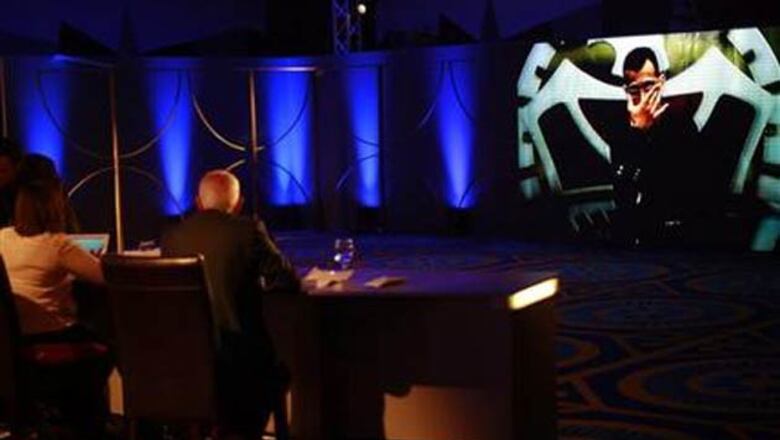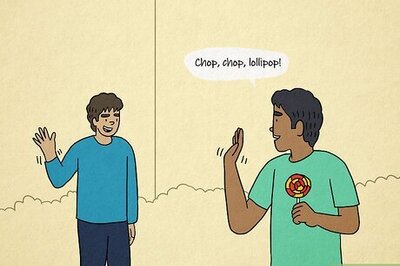
views
West Bank: The Palestinians haven't elected a president since 2005, but now they are finally getting a chance to do so - virtually - thanks to a hit reality TV show.
'The President' is broadcast weekly on Maan TV, a popular independent Palestinian TV station. It offers contestants a chance to address the Palestinian people on what they would do on a variety of subjects if elected president. They are grilled by a panel of politicians, professors and business people who, with input from the audience, vote them off - something they can't do in the real world, where their president is still in office several years after his term was supposed to expire.
Thousands of young Palestinians who applied to take part in the show have been whittled down to 15. A winner will be crowned in the finale scheduled for late June and get to travel the world as a mock Palestinian ambassador - and perhaps win a car as well.
"We are building a new generation of politicians. They are gaining skills from practice," said Kholoud Idabis, a former Cabinet minister and member of the panel. Other judges include Palestinian official Hanan Ashrawi and Arab-Israeli lawmaker Ahmad Tibi.
In their 20 years of limited self-rule, the Palestinians have had just two presidential elections. In 1996, longtime Palestinian leader Yasser Arafat was elected for a five-year term. He ruled without another election until he died in 2004. The following year, Mahmoud Abbas was elected for a four-year term. He's been in power ever since with no elections in sight. Critics accuse Abbas of planning on following Arafat's example, planning to rule until he dies. Abbas has no deputy, and his popular prime minister, Salam Fayyad, recently resigned in a power struggle with the president.
Abbas says he is willing to conduct elections, but first he needs to end the internal split between his government, based in the West Bank, and the Islamic militant Hamas, which rules the Gaza Strip. Talks have been going on for years without any significant progress. Abbas hopes to establish an independent state that includes both territories.
The original 1,200 participants selected to compete were all between the ages of 20-35, held a university degree and were born in the Palestinian territories. For each episode, they are given questions from the panel on issues such as Israeli settlements, the death penalty and how to revive the struggling economy.
Hussein al-Deik, 31, for example, said he would oppose the type of violence espoused by Palestinians last decade when they carried out hundreds of suicide bombings and other attacks against Israeli civilians. He said he would promote peaceful demonstrations against Israel's occupation of the West Bank and even oppose stone throwing at Israeli soldiers and settlers - a common Palestinian practice. "Stones can prompt violence and can cause us to be victims," he said, though he said he supported international legal action against Israeli 'war crimes.'
Other candidates echoed his support for nonviolence, a contrast to wider Palestinian society where support for 'armed struggle' remains a common sentiment.
A survey released Thursday by the Pew Research Center's Global Attitudes Project found that 45 percent of Palestinian respondents believe 'armed struggle' is the best way to achieve independence from Israel, compared to 15 percent who supported negotiations and another 15 percent who supported 'nonviolent resistance.' The survey questioned 810 people and had a margin of error of 4.4 percentage points. The center noted that roughly 5 percent of the Palestinian population was excluded because of nomadic Bedouin lifestyles or lack of access caused by Israeli military restrictions.
The show's producer says that if there are no elections in practice, at least there should be on TV.
"We wanted to create a new spin on reality TV - reality TV with a purpose," said Seema Rasool. "For decades, Palestine has only had two presidents, Abu Amar (Yasser Arafat) and Abu Mazen (Mahmoud Abbas), thus we hope this show drives the Palestinian people to truly have a democratic state. This show in itself models democracy in practice."
There are no exact rating figures, but the show seems to be a popular topic of conversation among Palestinians.
Raed Othman, Maan's director, said the show is popular because it has tapped into the larger sense of civic involvement in politics following the upheavals taking place across the Arab world. He said entertainment shows often backfire, since viewers dealing with hardships do not want to be merely entertained.
"We found this show fits our conditions," he said. "We need elections, and there are no elections. We need an Arab Spring, and the show is our spring."
Mass protests have removed longtime leaders in Egypt, Libya, Tunisia and Yemen. Syria is engulfed in a civil war.
In contrast, the traditional Palestinian leadership has not been challenged, despite years of failed peace efforts with Israel and the bitter internal divide with Hamas. The show provides a rare outlet to take public shots at the 78-year-old Abbas.
"We don't see President Abbas in town. He spends most of his time flying when we really need his presence here," said Waad Fararjeh, a 21-year-old journalism student from Al-Quds University in east Jerusalem, one of three women remaining on the show. "If I become a president, I will focus on the economy. Our economy is bad, and there are no real efforts to revive it."
Three of the finalists are from Gaza, participating by videoconference, since travel between Gaza and the West Bank is virtually impossible.
Abbas, for his part, is taking the show in stride, said Sabri Saydam, an adviser to the president who also served as a jury member for some of the episodes.
"President Abbas is aware of the show, and he was happy, because he is interested in seeing new faces, youthful faces, in the political arena," he said. "The show is exciting, and people are interested because it presents different characters. Each one behaves differently toward the various issues."
Last decade, Israel had a similarly successful show, 'The Ambassador,' in which young Israelis competed to demonstrate who best represented their country against hostile criticism.
The Palestinian show has dispatched the candidates to get real life experience in government ministries, local municipalities, human rights organizations, schools and hospitals.















Comments
0 comment